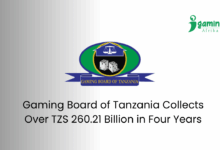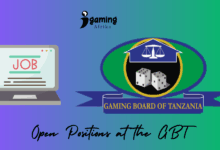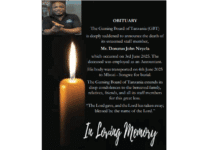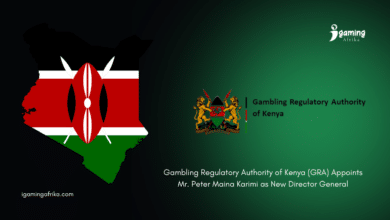Exclusive: Charting the Course – Exploring the Dynamics of the Tanzanian Gaming Industry
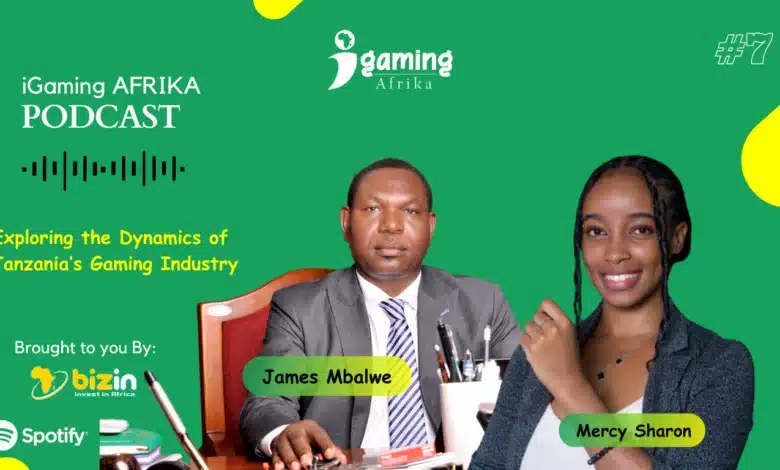
In November 2023, Mr. James Mbalwe was reappointed as the Director General of the Gaming Board of Tanzania (GBT), marking a significant milestone in the governance of the country’s gaming sector. With the recent appointments made by Her Excellency President Samia Suluhu Hassan, Mr. Mbalwe reflects on the significance of his role in overseeing the gaming industry in Tanzania.
In an exclusive interview with iGaming AFRIKA’s (IGA) very own, Mercy Sharon, Mr. Mbalwe shares his thoughts on various aspects of gaming regulation, achievements, challenges, and prospects for the Tanzanian gaming landscape. Join us as we explore the multifaceted dynamics of the Tanzanian gaming industry and gain valuable perspectives from Mr. Mbalwe, a key figure in shaping its trajectory.
iGaming AFRIKA: Congratulations on your reappointment as the Director General of the Gaming Board of Tanzania in November 2023. Can you share your thoughts on the significance of your role in overseeing the gaming industry in Tanzania, especially considering Her Excellency President Samia’s recent appointments?
James: Thank you so much. Being the Director General (DG) of the Gaming Board of Tanzania means I stand as a chief manager or someone who manages day to day activities of the board. According to the Gaming legislation, the Gaming Board is entrusted to a board of directors. However, the day-to-day functions are delegated to the director general. Being DG means you are responsible for the daily activities within the board and as director general, I would say that that is my role.
iGaming AFRIKA: The Gaming Board of Tanzania (GBT) recently won the best regulatory body award at the 47th Dar es Salaam International Trade Fair (DITF), an award that was presented by Zanzibar His Excellency President Dr. Hussein Mwinyi. What are some of the factors that may have contributed to the GBT being crowned winners in this category?
James: We are very grateful to the organisers of the trade fair and to the public at large because gaming is a unique sector and an industry with a lot of controversies. People do not normally recognize and accept gaming. So, finding out that we were being recognized by the public, was great on our side and this showed that we had been able to provide services to the public that had been acknowledged. We are grateful to everybody who voted in our favour and recognised the efforts we have been putting in, to see that our objectives within the industry have been achieved. The objectives are usually two main ones, one to generate revenue for the government coffers and secondly to engage in social development. So, I’d say that the Tanzanian public recognised what we have been doing as a board.
iGaming AFRIKA: In your role as Director General, have any regulatory measures been implemented or enhanced to maintain integrity, fairness, and responsible gaming within the Tanzanian gaming industry? Also, what are some of the campaigns that the board is carrying out or overseeing to sensitise the general public over gaming issues as well as responsible gaming?
James: You see, the gaming industry is always evolving so there are always changes and dynamics taking place. Since being appointed Director General, it is now almost seven years, there are so many things that have been done on the ground. Before my appointment, we did not have any regulatory systems to assist with regulation. During my tenure, we have been able to come up with electronic systems that have been able to help us govern the industry. We have been able to set up Circa, this is a system to do with licensing, we also have a system that focuses on the revenue aspect and players’ conduct. We have done a lot in terms of streamlining our licensing frameworks and our legal side. There are many changes we have had but these are some of the significant ones.
iGaming AFRIKA: GBT was established in terms of the Gaming Act Cap 41 of 2003 and became operational in 2004 following the restructuring of the defunct National Lottery. This led to the recent commemoration of the board’s 20th anniversary! Looking back, what significant milestones or achievements have stood out in the board’s journey since 2004?
James: I can say one of our achievements is our attempts to mitigate the stigma that surrounds gaming and to ensure that gambling is acceptable and has its contribution to the country. The industry as I mentioned earlier has been contributing significantly to the government coffers. For instance, the board was supposed to be getting subsidies from the government but after two years we were able to sustain ourselves and stopped receiving subsidies and I would say that is a huge achievement.
Second, I will say that we have been able to attract several investors, from within and outside the country. At the beginning, it was predominantly foreigners but now we have locals who are involved in investing here as well. We consider that a great achievement on our side. Again, we have been able to embrace technology. Technology is key when it comes to gaming. So in our case, we always embrace new technology and we have done quite a lot. For starters, we were among the first in the region to allow online gambling and we have online registration to cater for that and we are now seeing that the sector is growing. I would say these are among the few milestones we have had.
iGaming AFRIKA: The International Association of Gaming Operators Conference (IAGR 2023) that was recently held in Botswana saw the Director General of the National Lottery Regulatory Commission (NLRC) suggest that differences in regulations between African countries make them susceptible to being exploited by criminals for money laundering and funding terror operations. To combat this issue, Gbajabiamila proposed collaborative efforts to implement “Know Your Customer” practices, encourage reporting of suspicious transactions, conduct regular audits, and facilitate information exchange among regulatory bodies in Africa. What are your thoughts on this observation and recommendation?
James: I know it may be difficult to have standard regulations for everyone because we are from different operating environments but we are aspiring to have standard or common laws in the future, which would minimise what was pointed out by the director general of Uganda. He was right, for example, each country in East Africa has its own regulatory regime. For Tanzania and Uganda, we have been able to review our legislation but if we go to Kenya, they are still using very archaic laws. Such things make it difficult to achieve uniformity within the region.
Another thing is cooperation. For instance, we should have forums within the East African region to bring us regulators together. A place where we can share, benchmark, exchange notes and take joint initiative. We need to increase our cooperation within and I believe if we do that, we will be able to minimise these differences within the region and Africa and maybe head to wherever the rest of the world is. If you go to the European Union, you will find that they have established laws that cater within that region, so each country must abide by those laws. But here, each country has its laws of operation which may make it harder to come up with a uniform approach.
iGaming AFRIKA: In the span of 20 years, the gaming industry has undergone significant transformations. How has the Gaming Board adapted its regulatory strategies to keep pace with the evolving landscape of the gaming sector in Tanzania?
James: We have different strategies involved with this. One is to make sure that we employ the youth on the board. We know that the youth are quite innovative and easy when it comes to adapting to changes as opposed to elders. The youth are quite flexible when it comes to technology, so as a board, we always focus on the youth when it comes to employment.
The other thing is that we always liaise with our stakeholders and licensees. Whenever anything arises, we share it with them. We also share notes and encourage them to embrace technology too. We also make a point to exchange information with our peers without and within the continent, for example, South Africa in matters regarding technology. So, whenever there are developments, we ensure we go there, we learn, and we bring back the concepts of what we have learned with us.
iGaming AFRIKA: The Gaming Board of Tanzania disclosed increased gaming revenue back in July 2022. Are you still experiencing an upward trajectory? If so, could you elaborate on the factors contributing or that contributed to this growth and the strategies implemented to sustain and further enhance revenue generation?
James: I would attribute the growth of such an upward trajectory to good professionalism. We have been able to adhere to the law and have the best practices, these are very key things. So, it is because we have created an enabling environment that has propelled the growth of the industry.
iGaming AFRIKA: During the 20th Anniversary celebrations by the GBT. The board celebrated Betway Tanzania for being the most compliant operator in the country. Could you highlight some of the factors that were considered in the determination above and what would be your message to more operators that would like to join the list above?
James: We have 20 years to reflect on what we have done and strategise on what we want 20 years from now. So, during that event, we were able to recognize operators who have contributed significantly or those who surpassed our expectations. You see, being a regulator is not just for punishing operators when they go wrong, sometimes we also recognise their achievements and we decided to award those who were able to practise accordingly. And for anyone interested in the Tanzanian market, they must make sure they are compliant. We also believe in self-regulation. We don’t want to be chasing down lawbreakers, compliance should start with you.
Read Also: OdiBets Partners with Incentive Games to Revolutionize African Gaming
iGaming AFRIKA: Tanzania and Kenya have implemented a central monitoring system to enhance regulatory compliance and promote responsible gambling behaviors. Does Tanzania have any plans to do the same and what is the motivating factor(s) behind this decision?
James: I would say that we are the pioneers when it comes to this aspect of technology. Here, we started before coming up with the central monitoring system in 2007, we required operators to have their gaming management systems. When 2019 came, the government said we should not rely on the operators’ systems and that we should have our elaborate system. Our system, unlike Kenya and Uganda, is locally developed and not acquired.
We have a system called GEM which is a Gaming Electronic and Monitoring System that is locally developed. It was launched in 2019 and once it is foolproof we can make it available globally for other countries as well. When we were developing our system, we went to Italy, and they said that at the time very few countries had their system.
iGaming AFRIKA: Can you highlight any unconventional approaches the Gaming Board has introduced or is planning to introduce to keep pace with the evolving gaming landscape with the new technological advancements in the gaming sector?
James: It’s a hard question but we have had a combination of different approaches. For instance, there was a time we went to Nigeria, and we shared their experience. There is something we were not doing here. For them, if they wanted to find out if the systems were working, they would buy tickets and pretend to be the players. They counter-check the tickets within the system. So, they would go to several operators and buy tickets and if the tickets would not operate within the system, then (they would figure out) there is something wrong with the system, and if they reflected then everything was fine. So, this is why I would say it is a combination of approaches that are both conventional and unconventional, provided they give you what you want.
iGaming AFRIKA: Back in 2022, we had instances when the Gaming Board took decisive actions against illicit slot machines that were found in different parts of the country. Can you provide insights into the strategies employed by the board to identify and seize these machines, and what measures are in place to prevent their re-emergence?
James: Slot machines have been used since the board was put in place. One of the key operations back then was casino operations and slot machines. We also had slot machine shops, being one of the oldest operations. By then, slot machines weren’t a problem but recently, yes, slots have become a challenge because of interest. Locals are now engaging in gaming, and everyone wants to engage in slot business, and this comes with its challenges.
So, the board has taken the initiative. One you cannot import slot machines here without seeking approval. First, you must be the licensee to seek approval from the board and when the slot machine arrives at the port, we are always updated by the port authority. Finally, after approval at the port, we register the machines and issue stickers. So, there is a huge control of slot machines but again these illegal operators sometimes do not use authorised entry points. However, whenever we find them, we take sustained measures.
iGaming AFRIKA: How does the Gaming Board plan to facilitate its growth and development in the coming years?
James: If you come across our vision, we want to become a world-class regulatory body, but you see our industry is emerging, it’s not yet mature. So, one is to ensure the industry remains safe and becomes even more acceptable. I don’t know if we share the same experience with the rest of the region, but sometimes we have policymakers here stigmatising the industry.
So, our commitment is to let the industry be accepted by our policymakers before even getting down to the common ‘mwananchi’ (ordinary citizens). We will make sure that we create awareness from the top to the bottom. People know the law and the industry well. We know it has adverse effects but if it is properly regulated you never see the effects. We have seen the contribution of the gaming industry. If you go to Nevada for instance, gaming is one of their main economic activities as well as some other states in the USA. It’s different here but gaming should have a big space in our economy. If we can get it accepted by our policymakers and the citizens and if the industry will maintain being safe and keep on contributing to the government and the people, we believe our vision will have been realised.
iGaming AFRIKA: Why would you advise more investors to come and invest in the gambling sector in Tanzania?
James: The reasons I would share with would-be investors is first that we have been able to create a friendly operating environment so they should not shy away from investing here. Gambling here is legal and the challenges which were there initially when the board was conceived have been largely addressed. So, if someone is coming here, provided they are a genuine operator, they should expect to get their returns. We don’t want anyone to come here and regret it, we want investors who are coming here to come, invest, and enjoy their investments. To benefit while the country benefits as well, so it’s a two-way traffic.
iGaming AFRIKA: Give us the steps, requirements, procedures, and costs for acquiring various gaming licenses in Tanzania.
James: We have different licenses with different requirements, but I will highlight the main ones. If you check our law, it requires that anyone who comes here should have sufficient funds. These funds should also come from a legitimate source. You know gambling was initially associated with criminal activity, so we must make sure your sources are legitimate. You should also not have a criminal record.
Then we discussed the issue of technology. You should come with up-to-date technology. We are looking for technology that will be able to match the prevailing circumstances. I think those are the three things that are key for anyone who wants to invest in Tanzania.
iGaming AFRIKA: Are there any closing remarks you would like to give before we conclude today’s session?
James: I am particularly grateful for this interview. I know through this interview people will be able to know what is happening in Tanzania. I know maybe a large segment of people don’t know what is happening here and sometimes you find people who are not Tanzanian know more about Tanzania than Tanzanians themselves. So hopefully through this, they can learn more.
We also still welcome investors in Tanzania because this is the opportune time for people to come and invest here in Tanzania since we have a favourable operating environment. And as much as we are encouraging people to invest, we are also looking for serious investors, nonetheless.
Quotes
I can say one of our achievements is our attempts to mitigate the stigma that surrounds gaming and to ensure that gambling is acceptable and has its contribution to the country.
We should have forums within the East African region to bring us regulators together.
So, our commitment is to let the industry be accepted by our policymakers before even getting down to the ccommon‘mwananchi (ordinary citizens). We will make sure that we create awareness from the top to the bottom.
We don’t want anyone to come here and regret it, we want investors who are coming here to come, invest, and enjoy their investments.








